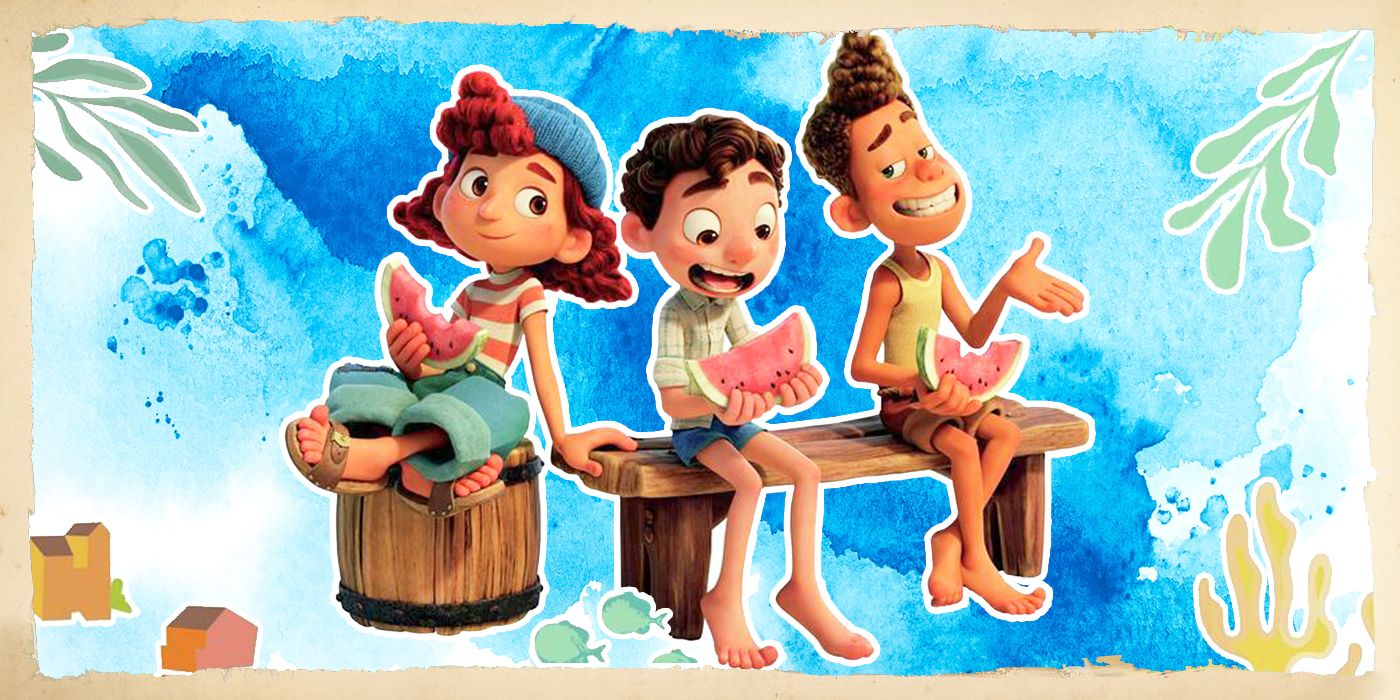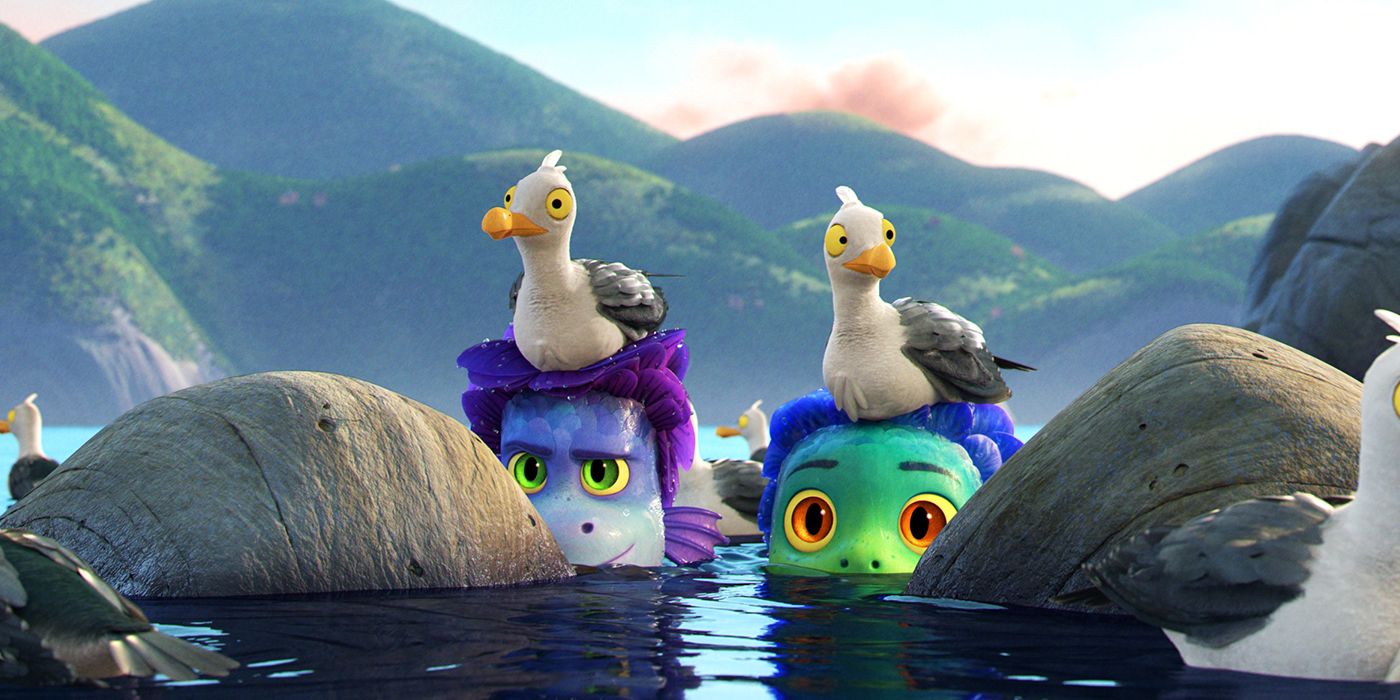Pixar movies are typically high in concept and big in picture. Dating all the way back to Toy Story, their very first film, the animation studio has specialized in creating incredibly detailed hidden worlds -- fully functioning societies that are meant to exist either at the edges of our own reality or in a closely-related parallel universe. Monsters, Inc. features the bustling city of Monstropolis, which is home to an elaborate factory where the screams of human children are harvested to power the city. Inside Out reimagines the inside of our brains as a memory-filled fantasy landscape overseen by control-room workers who are a stand-in for human emotions. Soul takes an in-depth look at the “Great Before,” a cosmic plane where unborn souls discover the personality traits that will shape the human beings they are to become. There’s Andy’s Room and Ant Island and Radiator Springs, and Pixar always takes great care to fill out these little worlds with as much detail as they possibly can without it getting in the way of the story. When watching a Pixar movie, it’s always very clear how everything works.
Except now there’s Luca, which takes everything Pixar has been doing for the last quarter century and throws it out the window. And honestly? The film is immensely better for it. Now streaming on Disney+, Luca tells the unconvoluted story of Luca Paguro, a young sea monster (Jacob Tremblay) who leaves his underwater home to go adventuring up on the dry land. This being a Pixar film, it’s easy to imagine a version that meticulously chronicles the inner-workings of the sea-monster village where Luca lives. We’d learn all about their sea-monster society, including how their submerged town functions and how they stay hidden from humans. We’d meet not only Luca and his parents but also his neighbors and friends and a bunch of other colorful characters who fill out Luca’s hidden universe. It’s not difficult to imagine because this is exactly what Pixar has always done with their movies. (In fact, Pixar has already given us one version of a vast, interconnected underwater community in both Finding Nemo and its sequel.)
But, in Luca, we learn none of that stuff. Here’s the grand total of what we know about Luca’s place in the world before he sneaks off to the nearby human town of Portorosso, where the meat of the story takes place: His parents desperately want him to remain below the sea’s surface where he’ll be safe. He spends a portion of his day herding small fish in a vaguely described job that seems more like a teenager’s chore than an occupation. He is biologically able to disguise himself as a human whenever he leaves the water. And, really ... that’s it.
Instead of making a movie about how things work (which can describe so many Pixar movies), director Enrico Casarosa and writers Jesse Andrews and Mike Jones have made a movie about how things feel. Luca is very much a meditation on feeling like an outsider and not being comfortable in your own body, and the film’s creators have gone beyond merely prioritizing those themes to flat-out eliminating anything that doesn’t directly service them. And that’s the key difference here. It’s not like other Pixar movies haven’t featured strong, emotional underpinnings. Of course they have. But, in the past, it has always come packaged with detailed world-building. Like Luca, WALL-E is another Pixar character who leaves behind everything he knows in search of emotional fulfillment. But even WALL-E takes great care to set up exactly what happened to make Earth uninhabitable and how things operate on the Axiom starliner after WALL-E stows away onboard. Luca doesn’t do anything like that.
This may be one of the big reasons many have cited the films of Studio Ghibli as an obvious influence on Luca. Sure, there’s the port-city setting and the water-color visuals, but Studio Ghibli films have also often trafficked in the idea of magic as part of everyday life. It’s never overly explained or examined … it just is. There’s a giant moving castle that roams the countryside. Or there’s a large spirit that lives in the woods next to your house. Studio Ghibli films tend to use these fantastical setups as merely starting points for strong spiritual journeys that focus on character. Luca uses a very similar trick. The fact that Luca is a sea monster is almost beside the point. What matters is that he aches for something more, and when he finally does meet and befriend a creature like himself from outside his family unit -- a similarly aged sea monster named Alberto (Jack Dylan Grazer) who spends most of his time on land -- a path to a more fulfilling life opens up to him.
By not overexplaining everything, Luca leaves much open to interpretation, which feels like a step in a new direction for Pixar. Some have pointed out that the film could be viewed as a story about a blossoming gay romance between two young men coming to terms with their burgeoning sexuality. And it totally could! Or, if you prefer to read it as a simpler tale of outsiders finding that they have strength in numbers and the ability to change the thinking of the people around them, you could do that too. And, ultimately, I think that’s the point of Luca. Because the worlds of Pixar are so richly detailed, people often fall into the trap of trying to pick apart the inconsistencies, be it the weird rules of toy self-awareness or the fact that the automobiles in Cars have doors for people who don’t exist. In Luca, there’s nothing to pick apart. There’s just the beautiful and moving story of a young sea monster who meets a friend and goes on an adventure, which leads to meeting another friend, which then opens up a universe of possibilities for our hero. It’s simple. It’s hugely satisfying. And it’s a refreshing change of pace from Pixar’s usual big-picture approach.



